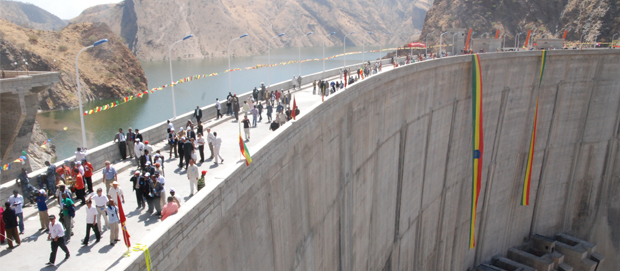
Tanzania Foreign Affairs and International Cooperation Minister Bernard Kamillius Membe (Left), with Fekahmed Negash, director of boundary and trans-boundary rivers at Ethiopia’s Ministry of Water, Energy and Irrigation (R)
The Tanzania Minister of Foreign Affairs and International Cooperation Bernard Kamillius Membe recently called for a review of the 2010 Comprehensive Framework Agreement signed by river Nile stakeholder nations to resolve a water dispute between Egypt, Sudan and Ethiopia.
The Entebbe, Uganda, Agreement was signed by all the upstream Nile Basin countries to undo an outdated colonial-era agreement overly favouring Egypt and Sudan on the use of the waters.
Speaking from Dodoma, in Central Tanzania in late May, Membe said the Entebe agreement should be reviewed in order to reconsider Egypt’s water needs.
But an Ethiopian official has told a news agency in Addis Ababa Membe’s statement differs from the position of the Tanzania Government regarding the 2010 agreement.
“The Ethiopian government contacted relevant authorities in Tanzania, which affirmed that statements made recently by the minister of foreign affairs do not reflect the official stand of the Tanzanian government,” Fekahmed Negash, director of boundary and trans-boundary rivers at Ethiopia’s Ministry of Water, Energy and Irrigation, told Anadolu Agency.
The Tanzania Minister of Foreign Affairs and International Cooperation called for a review of the 2010 agreement in order to consider Egypt’s water needs.
“Tanzania feels that the chapter providing equal and fair share of the natural resources of the Nile to all states ought to be reviewed in favor of Egypt considering that it is a desert country whose lifeline is the Nile,” Membe said in a written document submitted to parliament.
In 2010, upstream states Ethiopia, Kenya, Uganda, Rwanda and Tanzania all signed the Cooperative Framework Agreement regulating Nile water use. Burundi signed on to the treaty in 2011.
The deal aims to replace a colonial-era treaty that gives Egypt and Sudan the lion’s share of river water.
Minister Membe said that Tanzania would call for a meeting of all Nile Basin states to review the 2010 agreement. The meeting, he said, would be attended by foreign ministers and ministers dealing with water issues.
“This is not official statement of the Government of Tanzania and we made sure that there is no change of position,” Negash quoted a Tanzanian official as saying, according to the Website World Bulletin. The Ethiopian official declined to name the Tanzanian officials he had talked to.
“The Tanzanian foreign minister is apparently not well informed of the agreement he spoke about. He called the Comprehensive Framework Agreement as a ‘water sharing’ one, which in fact it is not,” Negash said.
Water distribution among Nile basin states has long been regulated by a colonial-era treaty giving Egypt and Sudan the lion’s share of river water.
Ethiopia, for its part, says it has never recognized the treaty. Relations between Ethiopia and Egypt have been strained due to a multibillion hydroelectric dam now being built by Addis Ababa on the Nile’s upper reaches.
Egypt is worried that the Ethiopian dam project will reduce its historical share of Nile water.
Citing its need for development, Ethiopia says it must build a series of dams to generate electricity, both for local consumption and export.
Addis Ababa insists the new dam will benefit downstream states Sudan and Egypt, both of which will be invited to purchase the electricity thus generated.




